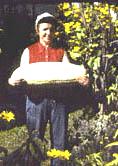|
Biogardener Homepage
Getting Started Organically
Even for beginners
Edible Gardening
For food, drink, & medicine
Healing Hug
Stories of spiritual & emotional healing
Allergy Lifeline
Natural help from personal experience
Sunny Manitoba
through the eyes of an immigrant and long-time resident
Born to Be Creative
discovering your inborn creativity
Theirs Is the Kingdom
Stories for children
Heritage German
German culture beyond political borders
Biogardener Guestbook
Please Sign
or Read Entries
 Send me your own organic gardening story. Email me by clicking on the mailbox graphic. Send me your own organic gardening story. Email me by clicking on the mailbox graphic.

Related Article
Paradise Lost, the Tyranny of Conformity
Carol Wallace's account of the illegal destruction of my naturalized garden by the City of Winnipeg in 1998.
 Webmaster's Bio
Webmaster's Bio
Meet Traute Klein, biogardener.
|
Organic Gardening Not a Big Deal
by Traute Klein, biogardener
Organic gardening is not a big deal. It is the same gardening which has gone on since time immemorial. It is only in recent history that man has departed from the trusted and true wisdom of the ages to which we are now trying to return.
Tribute to My Father
I dedicate this article to the memory of Willi Wollenberg, AKA "Papi," my late father. He was my first gardening teacher. As I trudged along with him hand-in-hand to our allotment garden on the edge of town, I learned to look at each plant as a child to be nurtured and appreciated. I was the only member of the family to get this tutoring. My older brothers grew up before we had that garden, and by the time my younger siblings would have joined my father, we had become refugees. We did not get to grow another garden until we came to Canada in 1952 where we were assigned one under the powerlines of Manitoba Hydro.
Organic, Why Not?
So people call certain gardening methods "organic" and think that they have discovered the magic bullet or the fountain of youth. Big deal! My parents gardened organically as did their parents and everyone else before them since the first day that man decided to till the ground,  and according to the book of Genesis, that happened way back with Cain, the first-born son of Adam and Eve. He was a tiller of the ground. Unfortunately, he was also the first murderer, so maybe that is where organic gardening got off to a bad start. and according to the book of Genesis, that happened way back with Cain, the first-born son of Adam and Eve. He was a tiller of the ground. Unfortunately, he was also the first murderer, so maybe that is where organic gardening got off to a bad start.
Organic, a Way of Life
Organic gardening is not a set of methods. It is a way of life, a commitment to the health of the environment and to all of creation, a commitment to learn from the wisdom of the ages. If you have the desire for that commitment, you can learn to garden organically, even if you know nothing about it right now.I consider myself blessed to have grown up at a time when the term "organic gardening" was not yet invented, because there was only one kind of gardening, and that was in harmony with Mother Nature. I have never departed from this type of gardening, because no one was ever able to convince me that the "modern" methods were more beneficial. By the same token, I have never departed from the holistic living which I advocate in my Natural Health topic here at Suite101. I grew up with it and it worked fine, so why should I have gone looking for trouble by testing something which at best seemed risky.
When I look at the labels of prepared foods these days, I stay away from lists which are too long and with words not in my everyday vocabulary. Many of these ingredients eventually end up being banned as carcinogens only to be replaced with new ingredients which in a decade will also be banned as carcinogens.
The same is true for gardening ingredients. I don't buy fertilizers, herbicides, and pesticides, and I don't like the names of the ingredients on the labels. Our ancestors lived healthy lives eating the produce of the land without all those additives and so do I. Our earth produces every ingredient necessary for healthful survival.
My Secrets of Healthy Gardening
Let me give you a preview of what I consider the most important considerations for healthy and productive gardening practices.
- Accept Local Conditions
Grow a garden which is adapted to your climate and soil conditions. Forget about what garden centres try to sell you. You can only be a successful organic gardener if you work with Nature rather than trying to out-trick her.
- Restore the Soil's Natural Fertility
To help the soil to retain its present fertility, you need to return to it whatever comes out of it. If, however, you need to undo the damage of previous generations, then you need to add more than you take out, and of course, you need to stop the abuse.
- Foster Nature's Diversity
Nature favors bio-diversity. Pests thrive on monocultures and starve when faced with a wide selection of plants. The principle of companion planting is based on this rule of nature. Herb gardens as well as vegetable gardens are unnatural creations. Combine the two, and they will protect each other from harm. That is the principle of companion planting. My parents never heard that terminology, but they practiced it. That is why they never had a pest or disease problem in their garden and neither do I.
- Let Peace Reign in Your Garden
As long as Adam and Eve lived in peace with each other, with God, and with creation, their inner harmony was reflected in the world around them. When that harmony was destroyed, paradise ceased to exist. Every garden reflects the image of its creator. If you are at peace with yourself and with creation, your garden will thrive and so will the creatures in it. In my case, that includes all the cats and birds of the neighborhood, and, believe it or not, the cats are not bothering the birds and neither do they damage my garden.
© Traute Klein, biogardener
-
|
 Send me your own organic gardening story. Email me by clicking on the mailbox graphic.
Send me your own organic gardening story. Email me by clicking on the mailbox graphic.

 and according to the book of Genesis, that happened way back with Cain, the first-born son of Adam and Eve. He was a tiller of the ground. Unfortunately, he was also the first murderer, so maybe that is where organic gardening got off to a bad start.
and according to the book of Genesis, that happened way back with Cain, the first-born son of Adam and Eve. He was a tiller of the ground. Unfortunately, he was also the first murderer, so maybe that is where organic gardening got off to a bad start.